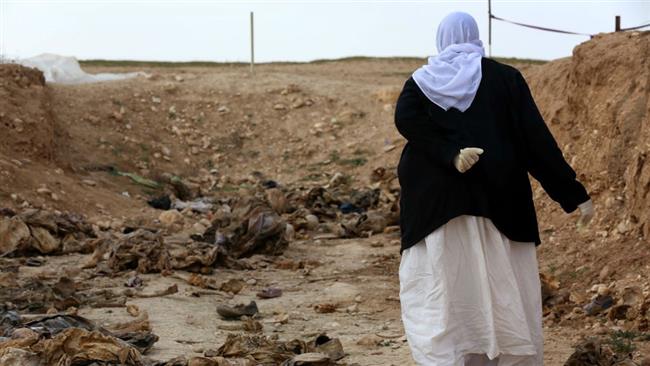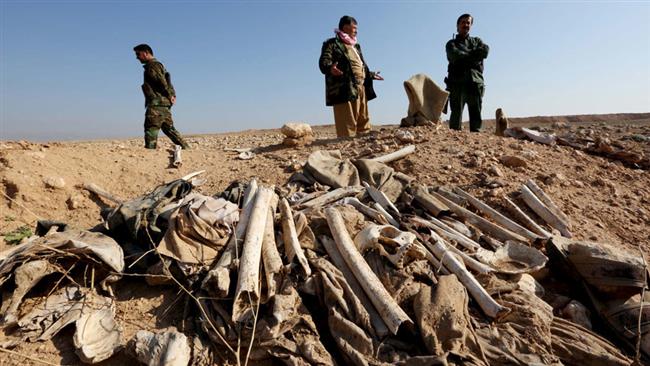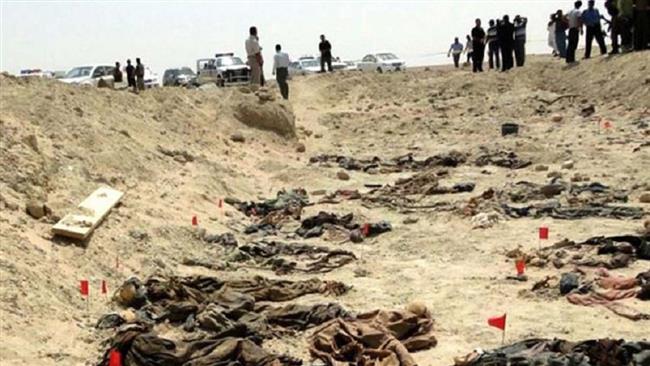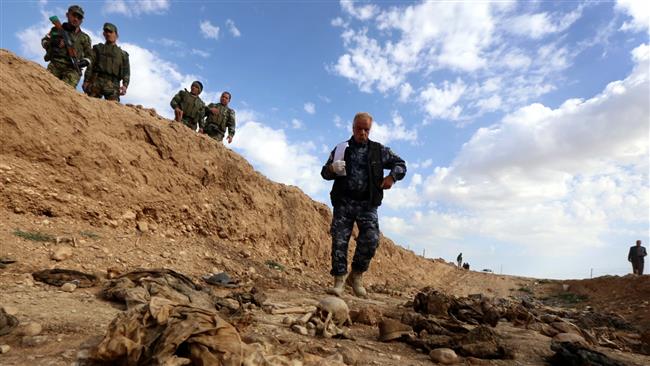Dozens of civilian bodies found in mass grave in Iraq’s Mosul
Iraqi security forces have found a mass grave in the northern province of Nineveh, which contains the bodies of dozens of civilians believed to have been executed by Daesh Takfiri terrorists when they were in control of the area.
The Directorate of General Military Intelligence said in a statement on Monday that police forces made the discovery on a road linking the al-A'ayaziyah district of the provincial capital city of Mosul, located some 400 kilometers (250 miles) north of Baghdad, to the nearby town of Tal Afar, and authorities have so far recovered the bodies of 25 people from the grave, the Arabic-language Iraqi News Agency reported.
Security forces have handed over the bodies to the forensic department in Mosul to be identified and returned to their relatives.
Captain Amir Wathiq told Arabic-language Basnews news agency that members of the Federal Police force had unearthed the mass grave in Hammam al-Alil town, located around 25 kilometers south of Mosul, on April 11.
Wathiq added the mass grave contained the bodies of around 60 victims, noting that there were mostly the remains of women among the corpses.
The provincial police official further noted that the bodies had been transferred to the forensic department in Mosul to undergo DNA tests.
In early April, Iraqi forensic specialists found a mass grave containing the remains of about 160 victims of a June 2014 massacre by Daesh Takfiri terrorists at an Air Force camp in the country’s north-central province of Salahuddin.
Zaid Ali, head of the forensic office, said a joint team from his bureau and the Martyrs Foundation found 158 bodies inside the palace compound of former dictator Saddam Hussein in Tikrit, located 140 kilometers northwest of the capital Baghdad, on April 2.
He noted that DNA tests were being conducted on the corpses in order to identify them.
On December 9, 2017, Iraq’s Prime Minister Haider al-Abadi declared the end of military operations against Daesh in the Arab country.
Seven months later, Abadi formally declared victory over Daesh extremists in Mosul, which served as the terrorists’ main urban stronghold in the conflict-ridden Arab country.
In the run-up to Mosul's liberation, Iraqi army soldiers and volunteer Hashd al-Sha’abi fighters had made sweeping gains against Daesh.
The Iraqi forces took control of eastern Mosul in January 2017 after 100 days of fighting, and launched the battle in the west on February 19 last year.
Daesh began a terror campaign in Iraq in 2014, overrunning vast swathes in lightning attacks.
Spain jurists demand ties with Israel ties be cut
VIDEO | Press TV's news headlines
VIDEO | Iran honors top Science Olympiad medalists
VIDEO | Austrians arrested at Gaza protest in Vienna
10 killed in bus crash in western Iran
VIDEO | One-man-band journalism with Civili
5 Israeli forces killed as Palestinian fighters face up to regime’s war machine
VIDEO | An insider's view of the country: Persian Tahini, Royan in Mazandaran



















 This makes it easy to access the Press TV website
This makes it easy to access the Press TV website